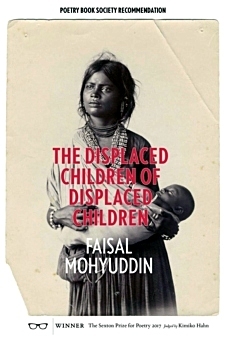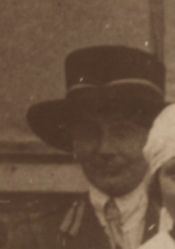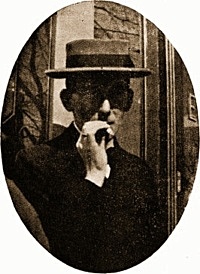Fleurs du Mal Magazine


Or see the index
Poetry. Asian & Asian American Studies. Moving through past, present and future, this is a family history that journeys between America, Pakistan, modern Europe and even into space.
 Faisal Mohyuddin delves into the past of his parents and their neighbours in Pakistan and India in a self-consciously impossible attempt to find some way of belonging to a place that is lost. Moving from elegant ghazals of lament to stuttering, disjointed phrases of yearning, Mohyuddin portrays with restrained emotion the complexities of what it is to be displaced, geographically, spiritually, psychologically. With moments of sorrow interspersed with unsettling humour, deep familial love and celebrations of beauty, it is a story recognizable to any who have felt displaced in a new world. If the personal is political, then this is truly poetry for our times.
Faisal Mohyuddin delves into the past of his parents and their neighbours in Pakistan and India in a self-consciously impossible attempt to find some way of belonging to a place that is lost. Moving from elegant ghazals of lament to stuttering, disjointed phrases of yearning, Mohyuddin portrays with restrained emotion the complexities of what it is to be displaced, geographically, spiritually, psychologically. With moments of sorrow interspersed with unsettling humour, deep familial love and celebrations of beauty, it is a story recognizable to any who have felt displaced in a new world. If the personal is political, then this is truly poetry for our times.
Faisal Mohyuddin, a child of immigrants from Pakistan, is the author of the chapbook The Riddle of Longing (Backbone Press, 2017). He is the recipient of the 2014 Edward Stanley Award from Prairie Schooner and a 2017 Gwendolyn Brooks Poetry Award. A graduate of Carleton College, Northwestern University, and Columbia College Chicago, he is also an alumnus of the U.S. Department of State’s Teachers for Global Classrooms program. He teaches English at Highland Park High School in Illinois, serves as an educator adviser to the global not- for-profit Narrative 4, and lives with his wife and son in Chicago. THE DISPLACED CHILDREN OF DISPLACED CHILDREN is his debut full-length collection.
The Displaced Children Of Displaced Children
by Faisal Mohyuddin (Author)
Paperback
April 2, 2018
88 pages
Publisher: Eyewear Publishing
Language: English
ISBN-10: 1912477068
ISBN-13: 978-1912477067
$14.99
£10.99
new poetry
fleursdumal.nl magazine
More in: - Book Lovers, - Book News, Archive M-N, Art & Literature News
The Electronic Literature Organization (ELO) holds its 2018 Conference and Festival, hosted by the Université du Québec à Montréal from 13 to 17 August 2018.
 The Conference, the Festival and Exhibits will be held August 13th to 17th in downtown Montréal, Québec, Canada. Mind the Gap! will be bilingual, with both English and French tracks, showcasing Montreal’s important and dynamic local Québécois e-lit/digital arts community and extending a special welcome to e-lit’s global francophonie.
The Conference, the Festival and Exhibits will be held August 13th to 17th in downtown Montréal, Québec, Canada. Mind the Gap! will be bilingual, with both English and French tracks, showcasing Montreal’s important and dynamic local Québécois e-lit/digital arts community and extending a special welcome to e-lit’s global francophonie.
The aim of this conference is to think about e-lit in a digital culture. What is its relationship to current cultural practices and trends?
Two directions are proposed: explorations and interventions. The first direction features e-lit’s exploratory nature, its formal aspects, its use of technology, its renewal of narrative conventions, and at the same time its impact on literary theories and methodologies to renew themselves.
The second direction considers e-lit’s place in the public sphere, its relationship to digital and urban culture, to forms of conservation and presentation, and also to performance.
# more information on website ELO 2018 Mind The Gap!
ELO 2018 Mind The Gap!
13 – 17 August 2018
The Electronic Literature Organization (ELO) announces its 2018 Conference and Festival, hosted by the Université du Québec à Montréal.
fleursdumal.nl magazine
More in: #Archive A-Z Sound Poetry, #Archive Concrete & Visual Poetry, Art & Literature News, AUDIO, CINEMA, RADIO & TV, Literary Events, Visual & Concrete Poetry

Address to Edinburgh
1.
Edina! Scotia’s darling seat!
All hail thy palaces and tow’rs,
Where once, beneath a Monarch’s feet,
Sat Legislation’s sov’reign pow’rs :
From marking wildly-scatt’red flow’rs,
As on the banks of Ayr I stray’d,
And singing, lone, the ling’ring hours,
I shelter in thy honor’d shade.
2.
Here Wealth still swells the golden tide,
As busy Trade his labours plies ;
There Architecture’s noble pride
Bids elegance and splendour rise :
Here Justice, from her native skies,
High wields her balance and her rod ;
There Learning, with his eagle eyes,
Seeks Science in her coy abode.
3.
Thy sons, Edina, social, kind,
With open arms the stranger hail ;
Their views enlarg’d, their lib’ral mind,
Above the narrow, rural vale ;
Attentive still to Sorrow’s wail,
Or modest Merit’s silent claim :
And never may their sources fail!
And never Envy blot their name!
4.
Thy daughters bright thy walks adorn,
Gay as the gilded summer sky,
Sweet as the dewy, milk-white thorn,
Dear as the raptur’d thrill of joy!
Fair Burnet strikes th’ adoring eye,
Heav’n’s beauties on my fancy shine :
I see the Sire of Love on high,
And own His work indeed divine!
5.
There, watching high the least alarms,
Thy rough, rude fortress gleams afar ;
Like some bold vet’ran, grey in arms,
And mark’d with many a seamy scar :
The pond’rous wall and massy bar,
Grim-rising o’er the rugged rock,
Have oft withstood assailing war,
And oft repell’d th’ invader’s shock.
6.
With awe-stuck thought and pitying tears,
I view that noble, stately dome,
Where Scotia’s kings of other years,
Fam’d heroes! had their royal home :
Alas, how chang’d the times to come!
Their royal name low in the dust!
Their haplesss race wild-wand’ring roam!
Tho’ rigid Law cries out: ‘’Twas just!’
7.
Wild beats my heart to trace your steps,
Whose ancestors, in days of yore,
Thro’hostile ranks and ruin’d gaps
Old Scotia’s bloody lion bore:
Ev’n I, who sing in rustic lore,
Haply my sires have left their shed,
And fac’d grim Danger’s loudest roar,
Bold-following where your fathers led!
8.
Edine! Scotia’s darling seat!
All hail thy palaces and tow’rs ;
Where once, beneath a Monarch’s feet,
Sat Legislation’s sov’reign pow’rs :
From marking wildly-scatt’red flow’rs,
As on the banks of Ayr I stray’d,
And singing, lone, the ling’ring hours,
I shelter in thy honour’d shade.
Robert Burns (1759 – 1796)
Address to Edinburgh
fleursdumal.nl magazine
More in: Archive A-B, Burns, Robert

Krähen
Ich will den Tag verbringen in den Feldern,
Will lächerlich wie jene Scheuche stehn;
Die großen Vögel möchten aus den Wäldern
Auch so auf mein Gewand herniederwehn,
Um Schultern krallen, flüstern in mein Ohr
Aus Mären, die im grünen Buch sie lasen,
Von Hugin und von Munin, Tyr und Thor,
Von Yggrasill dem Weltenbaum der Asen,
Und von der Väter Dienstwerk beim Adepten,
Des Roten Leuen Sud, dem Blumengift,
Der Mauerspalte, drein sie bergend schleppten
Des siechen Herrn geheim erfundne Schrift,
Und anderes Gewinde, blumig kraus,
Altfränkisch duftend wie Levkojenblüten,
Was ihnen nachtrab schrieb und Fledermaus
Und was sie selbst in klugen Häuptlein hüten.
Doch manche würden gleich die Scholle hacken
um meine Füße, die zum Kosten lädt
So wie ein Würzbrot, feucht und frisch vom Backen,
Bereitet mit dem blanken Feldgerät,
An weißen mandeln und dem Zitronat,
An Engerlingen sich und Würmern letzen,
Der Süße endlich satt zu Rast und Rat
Und schweigend sich auf meine Hände setzen.
Und einmal schlügen Schwärme, Riesenwehe,
Den wilden Flug aus Mitternacht mir nah
Mit harten Liedern, die nur ich verstehe,
In ihrem scharfen, ungefügen Krah,
Mit unheilvollem Braus im düstren Kleid
Und mit erzürntem, drohendem Bewegen;
So fielen sie in gotteslose Zeit
Und auf die Länder als ein schwarzer Regen,
Die Welt verstummte. Bis der Weiler stöhnte.
Und weithin klagte heulend eine Stadt
Zerfreßnes Auge, das den Vater höhnte
Und seiner Mutter Herz verstoßen hat.
Gertrud Kolmar
(1894-1943)
gedicht: Krähen
fleursdumal.nl magazine
More in: Archive K-L, Archive K-L, Kolmar, Gertrud

Sibylla Schwarz
Alß sie ein Poëtischer Geist tribe
Ich, der ich sonsten pflag von schlechten Dingen schreiben,
bin gänzlich umgekehrt, nun muß mein Lob wohl bleiben,
und grünen wie ein Zweig, iezt wil ich meinen Sinn,
von dem, das niedrig ist, biß in die Wolcken ziehn.
Die Göttin Fama wil mir selber Flügel geben,
die immer für und für am helle n Himmel kleben,
und wo der Venus Sohn hinfüro schiessen wil
nach mir, so raht ich, daß er in die Wolcken Ziel.
Da soll mein Ball=Plaz seyn, da soll das Glüder fliegen,
wie Spreu das brennen muß, und allzeit unten ligen.
Die Clio bindet mir schon selbst die Lohrbeer=Kron,
die Ewig grünen wird / nun soll die Kunst den Lohn
erlangen, recht; So muß ein freyer Sinn bekleiben;
nuhn, ich will immer auch bey meinen Worten bleiben,
und steigen mit dem Sinn des Himmels Leiter an,
ein jeder sey bereit, daß er mir folgen kan.
Sibylla Schwarz (1621 – 1638)
Gedicht: Alß sie ein Poëtischer Geist tribe
fleursdumal.nl magazine
More in: - Archive Tombeau de la jeunesse, Archive S-T, SIbylla Schwarz

The Mould
No doubt this active will,
So bravely steeped in sun,
This will has vanquished Death
And foiled oblivion.
But this indifferent clay,
This fine experienced hand,
So quiet, and these thoughts
That all unfinished stand,
Feel death as though it were
A shadowy caress;
And win and wear a frail
Archaic wistfulness.
Gladys Cromwell
(1885-1919)
The Mould
fleursdumal.nl magazine
More in: Archive C-D, CLASSIC POETRY, Cromwell, Gladys, Gladys Cromwell

Novalis
Elegie auf einen Kirchhof
Kirchhof, werter mir als Goldpaläste,
Werter einem jeden Menschenfreund,
Birgest manches Edlen Überreste
Aber auch wohl manchen Tugendfeind.
Trink die Tränen, welche meinen Lieben
Die hier ungestöret ruhn, geweint;
Stunden sagt, wo seid ihr denn geblieben,
Die ihr uns als Jünglinge vereint?
Sprosset auf zu dunklen Trauermyrten
Tränen, die die Liebe hier vergoß
Grünt, um meine welke Stirn zu gürten,
Meine Laute, der nur Schmerz entfloß.
Kirchhof, Freund der trüben Knabentage
Die mir schwanden tränenvoll dahin,
Hörtest du nicht oft auch meine Klage,
Wenn mich eine Freundin mußte fliehn?
Novalis (1772 – 1801)
Gedicht: Elegie auf einen Kirchhof
fleursdumal.nl magazine
More in: Archive M-N, Novalis, Novalis

Écrits
La vie répond – ce n’est pas vain
on peut agir
contre – pour
La vie exige
le mouvement
La vie c’est le cours du sang
le sang ne s’arrête pas de courir dans les veines
je ne peux pas m’arrêter de vivre
d’aimer les êtres humains
comme j’aime les plantes
de voir dans les regards une réponse ou un appel
de sonder les regards comme un scaphandre
mais rester là
entre la vie et la mort
à disséquer des idées
épiloguer sur le désespoir
Non
ou tout de suite : le revolver
il y a des regards comme le fond de la mer
et je reste là
quelquefois je marche et les regards se croisent
tout en algues et détritus
d’autres fois chaque être est une réponse ou un appel
Laure
(Colette Peignot 1903 – 1938)
Écrits
fleursdumal.nl magazine
More in: Archive K-L, Archive O-P, Laure (Colette Peignot)

New-Born
She is so wee,
So wise and dear
Her eyes can see,
Her ears can hear,
The flowers that grow
Below the snow,
The birds that peep
In their eggs asleep,
The songs we sing her
No other has heard,
The love we bring her
With never a word.
Harriet Monroe
(1860 – 1936)
New-Born
fleursdumal.nl magazine
More in: Archive M-N, Monroe, Harriet

Aus meiner Kinderzeit
Vaterglückchen, Mutterschößchen,
Kinderstübchen, trautes Heim,
Knusperhexlein, Tantchen Rös’chen,
Kuchen schmeckt wie Fliegenleim.
Wenn ich in die Stube speie,
Lacht mein Bruder wie ein Schwein.
Wenn er lacht, haut meine Schwester,
Wenn sie haut, weint Mütterlein.
Wenn die weint, muß Vater fluchen.
Wenn er flucht, trinkt Tante Wein.
Trinkt sie Wein, schenkt sie mir Kuchen:
Wenn ich Kuchen kriege, muß ich spein.
Joachim Ringelnatz
(1883 – 1934)
Aus meiner Kinderzeit
fleursdumal.nl magazine
More in: Archive Q-R, Joachim Ringelnatz

The Tables Turned
(An Evening Scene on the Same Subject)
Up! up! my Friend, and quit your books;
Or surely you’ll grow double:
Up! up! my Friend, and clear your looks;
Why all this toil and trouble?
The sun, above the mountain’s head,
A freshening lustre mellow
Through all the long green fields has spread,
His first sweet evening yellow.
Books! ’tis a dull and endless strife:
Come, hear the woodland linnet,
How sweet his music! on my life,
There’s more of wisdom in it.
And hark! how blithe the throstle sings!
He, too, is no mean preacher:
Come forth into the light of things,
Let Nature be your Teacher.
She has a world of ready wealth,
Our minds and hearts to bless
Spontaneous wisdom breathed by health,
Truth breathed by cheerfulness.
One impulse from a vernal wood
May teach you more of man,
Of moral evil and of good,
Than all the sages can.
Sweet is the lore which Nature brings;
Our meddling intellect
Mis-shapes the beauteous forms of things:
We murder to dissect.
Enough of Science and of Art;
Close up those barren leaves;
Come forth, and bring with you a heart
That watches and receives.
William Wordsworth (1770 – 1850)
Poem: The Tables Turned
fleursdumal.nl magazine
More in: Archive W-X, Wordsworth, Wordsworth, William
 Dada ist eine neue Kunstrichtung. Das kann man daran erkennen, daß bisher niemand etwas davon wußte und morgen ganz Zürich davon reden wird. Dada stammt aus dem Lexicon. Es ist furchtbar einfach. Im Französischen bedeutets Steckenpferd. Im Deutschen: Addio, steigt mir bitte den Rücken runter, auf Wiedersehen ein ander Mal! Im Rumänischen: ‘Ja wahrhaftig, Sie haben Recht, so ist es. Jawohl, wirklich. Machen wir’. Und so weiter.
Dada ist eine neue Kunstrichtung. Das kann man daran erkennen, daß bisher niemand etwas davon wußte und morgen ganz Zürich davon reden wird. Dada stammt aus dem Lexicon. Es ist furchtbar einfach. Im Französischen bedeutets Steckenpferd. Im Deutschen: Addio, steigt mir bitte den Rücken runter, auf Wiedersehen ein ander Mal! Im Rumänischen: ‘Ja wahrhaftig, Sie haben Recht, so ist es. Jawohl, wirklich. Machen wir’. Und so weiter.
Ein internationales Wort. Nur ein Wort und das Wort als Bewegung. Es ist einfach furchtbar. Wenn man eine Kunstrichtung daraus macht, muß das bedeuten, man will Komplikationen wegnehmen. Dada Psychologie, Dada Literatur, Dada Bourgeoisie und ihr, verehrteste Dichter, die ihr immer mit Worten, nie aber das Wort selber gedichtet habt. Dada Weltkrieg und kein Ende, Dada Revolution und kein Anfang. Dada ihr Freunde und Auchdichter, allerwerteste Evangelisten. Dada Tzara, Dada Huelsenbeck, Dada m’dada, Dada mhm’ dada, Dada Hue, Dada Tza.
Wie erlangt man die ewige Seligkeit? Indem man Dada sagt. Wie wird man berühmt? Indem man Dada sagt. Mit edlem Gestus und mit feinem Anstand. Bis zum Irrsinn, bis zur Bewußtlosigkeit. Wie kann man alles Aalige und Journalige, alles Nette und Adrette, alles Vermoralisierte, Vertierte, Gezierte abtun? Indem man Dada sagt. Dada ist die Weltseele, Dada ist der Clou, Dada ist die beste Lilienmilchseife der Welt. Dada Herr Rubiner, Dada Herr Korrodi, Dada Herr Anastasius Lilienstein.
Das heißt auf Deutsch: die Gastfreundschaft der Schweiz ist über alles zu schätzen, und im Ästhetischen kommt’s auf die Norm an. Ich lese Verse, die nichts weniger vorhaben als: auf die Sprache zu verzichten. Dada Johann Fuchsgang Goethe. Dada Stendhal. Dada Buddha, Dalai Lama, Dada m’dada, Dada m’dada, Dada mhm’ dada. Auf die Verbindung kommt es an, und daß sie vorher ein bißchen unterbrochen wird. Ich will keine Worte, die andere erfunden haben. Alle Worte haben andere erfunden. Ich will meinen eigenen Unfug, und Vokale und Konsonanten dazu, die ihm entsprechen. Wenn eine Schwingung sieben Ellen lang ist, will ich füglich Worte dazu, die sieben Ellen lang sind. Die Worte des Herrn Schulze haben nur zwei ein halb Zentimeter.
Da kann man nun so recht sehen, wie die artikulierte Sprache entsteht. Ich lasse die Laute ganz einfach fallen. Worte tauchen auf, Schultern von Worten; Beine, Arme, Hände von Worten. Au, oi, u. Man soll nicht zuviel Worte aufkommen lassen. Ein vers ist die Gelegenheit, möglichst ohne Worte und ohne die Sprache auszukommen. Diese vermaledeite Sprache, an der Schmutz klebt wie von Maklerhänden, die die Münzen abgegriffen haben. Das Wort will ich haben, wo es aufhört und wo es anfängt.
Jede Sache hat ihr Wort; da ist das Wort selber zur Sache geworden. Warum kann der Baum nicht Pluplusch heißen, und Pluplubasch, wenn es geregnet hat? Und warum muß er überhaupt etwas heißen? Müssen wir denn überall unseren Mund dran hängen? Das Wort, das Wort, das Weh gerade an diesem Ort, das Wort, meine Herren, ist eine öffentliche Angelegenheit ersten Ranges.
Hugo Ball
(1886-1927)
Eröffnungs-Manifest, 1. Dada-Abend
(Opening-Manifest of the 1st Dada-Evening)
Zürich, 14. Juli 1916
fleursdumal.nl magazine
More in: Archive A-B, Archive A-B, Ball, Hugo, DADA, Dada, Dadaïsme
Thank you for reading Fleurs du Mal - magazine for art & literature